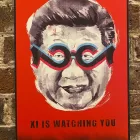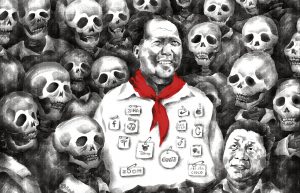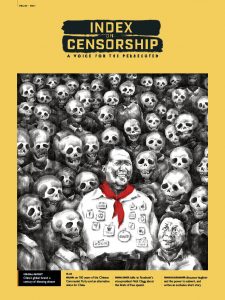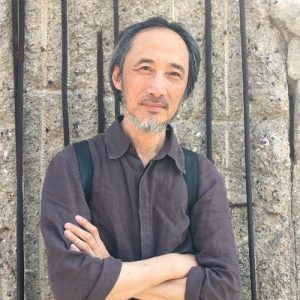30 Jun 2023 | China, News and features
A packed-out audience gathered at St John’s Church in Waterloo, London on Tuesday to see and hear an extraordinary night of talk, music and art aimed at showing how the Chinese Communist Party (CCP) reaches beyond its borders to repress freedom of expression around the world.
Badiucao, the political cartoonist, artist and human rights activist who is a target of the CCP, was the main speaker and detailed how the CCP attempts to suppress his work abroad and the lengths they will go to.
Known as the Chinese Banksy, Badiucao was born into an artistic family in 1986. He explained he was told by his father at a young age that to be an artist in China is dangerous, and he would have to leave the country to pursue his career. He left in 2009.

‘Tell China’s Story Well’, by Badiucao
“I didn’t want to be silenced and devalued by this terrible regime, and the way to go forward was to make art they don’t believe in,” he said.
However, in 2018 an exhibition of his work in Hong Kong was cancelled by organisers after threats made by the Chinese authorities. After this, he also felt there was a lack of interest to show his work in Australia but blamed a strategy of the CCP for this.
“The Chinese government are very good at playing mind games”, he said. “They will use a tactic of accusing people and countries of being racist, of simply being anti-Chinese.”
Fresh from his exhibition in Warsaw in June, Badiucao said the pressure from China not to exhibit his work in Europe has so far been successfully fought against, but the pressure has been ramped up. He explained that in Warsaw, when the exhibition was announced, the Chinese Embassy visited the museum and demanded its cancellation.

Banned By Beijing exhibition
“Wherever I take this exhibition, they follow me,” he said. “It’s a warning to anybody wanting to host my show, that you must handle the pressure you’ll get. However, what the CCP is doing is raising the bar for my future work.”
Baudicau feels that as a dissident abroad his work means the CCP will eventually catch up with him. He said: “To me it’s no longer a yes or no. It’s just a case of when. But the more people join [protest the CCP], we can all share this big burden together.”
Music was provided by the London Silk Road Collective, who performed the diverse music traditions found along the ancient Silk Road route, connecting Europe, Central Asia and South East Asia, with a particular focus on songs (both melancholy and hopeful) from the Uyghur region. Its singer, Uyghur campaigner Rahima Mahmut, spoke about the personal effects of being a dissident abroad when she explained the anguish of her sister recently dying in China but being unable to contact her family due to the CCP.
The event also marked the opening of the Banned by Beijing art exhibition, aimed at highlighting transnational repression from China. Badiucao’s artwork featured, as well as works from husband-and-wife painting duo Lumli Lumlong and cartoonist and former secondary school visual arts teacher Vawongsir. The exhibition will run in the crypt of St John’s Church, Waterloo until 10 July 2023.
28 Apr 2021 | Africa, Burma, China, Hong Kong, Magazine, Magazine Contents, Slapps, United States, Volume 50.01 Spring 2021, Volume 50.01 Spring 2021 extras

Illustration: Badiucao
Index looks back on 100 years of the Chinese Communist Party and how their censorship laws continue to shape the lives of people around the world and threaten their right to free speech. Inside this edition are articles by exiled writer Ma Jian and an interview with Facebook’s vice-president for global affairs, former UK deputy Prime minister Nick Clegg; as well as an exclusive short story from acclaimed writer Shalom Auslander.
Acting editor Martin Bright said: “I am delighted to introduce the latest edition of Index which marks the 100th anniversary of the Chinese Communist Party.”
“This year also marks the 50th anniversary of the magazine and I am proud that we are continuing the founders’ legacy of opposition to totalitarianism.”
“In this Spring edition of Index we are particularly pleased to publish an exclusive essay by the celebrated Chinese writer Ma Jian, who suggests that an alternative tradition of tolerance and freedom is still possible.”
 A century of silencing dissent by Martin Bright: We look at 100 years of the Chinese Communist Party and the methods of control that it has adapted to stifle free expression and spread its ideas throughout the world
A century of silencing dissent by Martin Bright: We look at 100 years of the Chinese Communist Party and the methods of control that it has adapted to stifle free expression and spread its ideas throughout the world
The Index: Free expression round the world today: the inspiring voices, the people who have been imprisoned and the trends, legislation and technology which are causing concern
Fighting back against the menace of Slapps by Jessica Ní Mhainín: Governments continue to threaten journalists with vexatious law suits to stop critical reporting
Friendless Facebook by Sarah Sands: An interview with Facebook vice-president Nick Clegg about being a British liberal at the heart of the US tech giant
Standing up to a global giant by Steven Donziger: A lawyer who has gone head to head with the oil industry since 1993 at great personal cost tells his story
Fear and loathing in Belarus by Yahuen Merkis and Larysa Shchryakova: The crackdown on journalism has continued with arrests. Read the testimony of two reporters
Killed by the truth by Bilal Ahmad Pandow: Babar Qadri was one of Kashmir’s most strident voices, until he was gunned down in his garden
Cartoon by Ben Jennings: Arguments about the removal of statues cause a stir
The martial art of free speech by Ari Deller and Laura Janner-Klausner: The question of Cancel Culture continues to rage. Is it really a problem?

Ma Jian
Burning through censorship: Censorship-busting online organisation GreatFire celebrates its 10th anniversary
The party is your idol by Tianyu M. Fang: China’s propaganda is adapting to target young people
Past imperfect by Rachael Jolley: Four historians explain how the CCP shaped China and ask if globalisation will be its undoing
Turkey changes its tune by Kaya Genç: Uighur refugees living in Turkey find themselves victims of a change in foreign policy
The human face and the boot by Ma Jian: The acclaimed writer-in-exile reflects on 100 years of the CCP and its legacy of bloodshed
A moral hazard by Sally Gimson: Universities around the world and the CCP’s challenges to academic freedom
Director’s cuts by Chris Yeung: Hong Kong broadcaster RTHK has been squeezed by China’s tightening control
Beijing buys Africa’s silence by Issa Sikiti da Silva: Africa’s rich natural resources are being hoovered up by China
A new world order by Natasha Joseph: Journalist Azad Essa found when he wrote about China in Africa, his writing was silenced
A most unlikely ally by Stefan Pozzebon: Paraguay has long been an ally of Taiwan, but it’s paying an economic price
China’s artful dissident: A profile of our cover artist: the exiled cartoonist Badiucao.
Lies, damned lies and fake news by Nick Anstead: Fake news is rife, rampant and harmful. And we can only counter it by making sure that the truth is heard
Censorship? Hardly by Clive Priddle: Even the most controversial book usually finds a publisher after it has been turned down
A voice for the persecuted by Ruth Smeeth: As Index celebrates its 50 year anniversary, we note why free speech is still important

Collective ©ALEXANDER NANAU PRODUCTION
Don’t joke about Jesus by Shalom Auslander: An exclusive short story based on a joke by the acclaimed author of Mother for Dinner
Poet who haunts Ukraine by Steve Komarnyckyj: Vasyl Stus, the writer who remains a Ukrainian hero, 35 years after perishing in a Soviet gulag
The freedom of exile by Khaled Alesmael, Leah Cross: A young refugee Syrian writer on the love between Arab men
Forbidden love songs by Benjamin Lynch: Iran’s underground pop music scene upsets the regime
Reviews: Saudi Arabia’s murder of Jamal Khashoggi, USA Gymnastics and healthcare in Romania: we review three new documentaries
War of the airwaves by Ian Burrell: The Chinese government faces difficulties with its propaganda network CGTN
10 Sep 2020 | News and features
[vc_row][vc_column][vc_single_image image=”114740″ img_size=”full” add_caption=”yes”][vc_column_text]“Someone has to say enough is enough,” said Shabana Mahmood, a member of parliament (MP) from the UK in a speech she delivered last night in the British parliament about the genocide of the Uighur people from the Chinese province of Xinjiang.
“The Chinese government continue unhindered with a campaign of what can only accurately be described as genocide, but where we should expect leadership and action, there is only a yawning void.”
Mahmood said the testimonies from Uighurs are “ever more disturbing”, citing a recent ITV news item in which a doctor spoke of forced sterilisation and abortion (in one instance a baby was still moving when it was discarded into the rubbish) and a man spoke of torture so extreme that he passed out. These are not isolated examples. It is estimated that at least one million people are incarcerated in camps across the region, while the millions of others who are not in a camp are subject to constant harassment and are living under extreme surveillance and control, right down to the language they speak.
“The charge sheet is long and horrific,” said Mahmood.
Mahmood mentioned new Disney movie Mulan, which was filmed in the province, as “one of the most striking examples of choosing to look away” and said there was a savage irony given the story of Mulan is one of family and emancipation.
“We should all be alarmed and appalled by what we are seeing, but we should all also resolve to forge a path forward for Uighur freedom,” argued Mahmood, who said this path involves various approaches, such as corporate and government accountability. We “cannot allow the fruits of forced labour to end up on our shores and in our homes”, she said, adding: “The Chinese Communist Party has busily been buying up influence and the silence of other countries.”
She also spoke of legal avenues, including those that have been used in recent years to help the Rohingya from Myanmar.
“History will judge us for the unforgivable lack of action thus far,” said Mahmood.
Many of these moves Mahmood called for were at a governmental level. What can we as individuals do?
1) Shout about it
Yes, a Tweet and a Facebook post are easy, but they are still better than nothing. We must use our words, especially when those in Xinjiang are being so woefully deprived of theirs. This is not to say that if we remain silent we are complicit. As the philosopher Julian Baggini wrote for the magazine earlier this year: “There are innumerable injustices around the world. Save for a handful of full-time activists and professionals in organisations such as Index, the finite supply of time ensures that most of us are silent about the vast majority of them.” Baggini specifically mentioned the Uighurs. But he also spoke about the concept of a “speech act”. “The key idea is very simple: words do not only convey information, they can actually do things. When a boss says ‘You’re fired’, a person loses their job. When a male manager says something misogynistic, he diminishes the status of female colleagues and makes their opinions count for less.” We can, through our words, foster an environment in which these actions are not condoned, in which Chinese officials find it increasingly difficult to go on live television and claim the atrocities are not happening, and in which world leaders struggle to continue their inaction.
2) Be wise to where our products come from
We at Index do not advocate outright banning – it goes against what we stand for. But nor do we promote companies and organisations involved in exploitation and human rights abuses. In an interview earlier this year about companies working with China, Yaqiu Wang, a senior researcher at Human Rights Watch, said: “By caving into the Chinese demands you are putting your values [aside] – social responsibility, freedom. It is really corrosive. You are affecting global freedom of speech.” As a consumer it’s difficult to know where everything comes from. That said, with each passing day evidence emerges linking major global brands to slave labour in Xinjiang. As consumers we can speak through our wallets. We can buy from the brands that we know aren’t complicit in the genocide; we can watch movies that aren’t filmed in the province. And we can support organisations like End Uyghur Forced Labour who are working hard to expose these links. We have choices here.
3) Protest on the streets
Live in London? The Chinese Embassy is located at 31 Portland Place, W1B 1QD. That’s a great place to start. Index have documented over the years countless examples of protest working, whether it’s a single person campaigning from their home or millions coming together. There’s a reason governments are so keen to control and clamp down on protest; it works.
4) Don’t normalise technology that is used against Uighurs
Genocides don’t happen overnight. The foundations for genocides are laid years, even decades, in advance. And while it’s difficult to pinpoint when the start date is, there are certain key moments. In the case of the Uighurs, one of these was the spread of mass surveillance. We need to fight against this, not just because video cameras sprouting up like mushrooms in our streets are bad for our own privacy. Also because if we are OK with it being used here we lose some of our moral high ground for arguing against it being used there.
5) Campaign for media freedom
There has been some phenomenal reporting on Xinjiang. Thanks to drone footage of camps by Buzzfeed and videos taken from inside a prison on the BBC, we are now gaining a far greater picture of what is happening in Xinjiang. Journalists are at the forefront of exposing the genocide. At the same time getting information out of Xinjiang is incredibly hard – the Chinese government tightly controls access to the province and some journalists have found their visas revoked as a result of their coverage. When we speak up for Uighurs, we must also speak up for the journalists who are putting their lives and careers on the line to bring us information. If you do hear of any media violations, whether related to Xinjiang or elsewhere, please report them to us or to our media map.
6) Give platforms to those in the Uighur community
Whether you are an events host, a media outlet or simply have your own blog, offer space for those from the Uighur community to talk. Uighurs have a rich and wonderful history of poetry and the spoken word. Why not publish some? That is what we are hoping to do in our winter issue. And in our forthcoming Autumn issue of the magazine, US-based Uighur activist Rushan Abbas, whose sister is in a concentration camp in Xinjiang, writes about her own experience and outrage. Please do subscribe to read this important article.
7) Finally, support organisations that are supporting Uighurs
There are now some excellent organisations to engage with. Here are a few of them: Campaign for Uyghurs, World Uyghur Congress and Uyghur Human Rights Project. You can donate to them and can sign petitions organised by them. Plus write to your local MP so that they can join people like Mahmood in putting pressure on the UK government to act.
Watch Mahmood’s speech in full here.[/vc_column_text][/vc_column][/vc_row][vc_row][vc_column][three_column_post title=”Read more on China” category_id=”85″][/vc_column][/vc_row][vc_row][vc_column][/vc_column][/vc_row]
27 Aug 2019 | Academic Freedom, China, News and features, United States
[vc_row][vc_column][vc_video link=”https://youtu.be/b21faoXVpM4″][vc_column_text]“Students in the United States must be free to express their views, without feeling pressured to censor their speech…We can and will push back hard against the Chinese government’s efforts to chill free speech on American campuses.” This is what Marie Royce, US assistant secretary of state for educational and cultural affairs, said in her address welcoming Chinese students to American universities in July 2019.
As much a warning as a welcome, the speech illustrates the balancing act America and other western countries often perform when engaging with Chinese people and organisations on campus. The presence of the Chinese Communist Party on campuses severely limits the free expression of Chinese students, and threatens more broadly to curtail academic freedom, the right to protest, and the ability to engage with the uncomfortable truths about the Chinese government honestly.
To understand the situation, one must first understand the unique nature of the party apparatus. The CCP attempts to control not only China’s political arena but every aspect of Chinese citizens’ lives, at home and abroad, including on US campuses. Dr Teng Biao, a well-known Chinese human rights activist and lawyer, tells Index on Censorship: “It’s quite unique. The party’s goal is to maintain its rule inside China at all costs, and so it sets about making the world safe for the CCP. It is all-directional.”
That control looks very different abroad than it does at home. CCP does not control much of its foreign influence network directly. “It has different ways of implementing influence,” Teng explains. Some Chinese organisations “are directed by the Chinese government and don’t have much independence in making decisions.” However, other organisations, such as alumni networks and Chinese businesses, as well as Chinese students, have their own agency and goals, and operate largely independently.
Sources from US intelligence agencies to the New York Times have reported that the Confucius Institutes, which teach Chinese language skills to non-Chinese people, and the Chinese Students and Scholars Associations, which are student-led organisations that provide resources for Chinese students and promote Chinese culture, are directed by the CCP. The CSSA has worked closely with Beijing to promote its agenda and suppress critical speech. According to Royce, “there are credible reports of Chinese government officials pressuring Chinese students to monitor other students and report on one another” to officials, and the CSSA often facilitates this spying.
Similarly, the Confucius Institutes, have a history of stealing and censoring academic materials, have been accused of attempting to control the Chinese studies curriculum, and have been implicated in what FBI director Cristopher Wray recently described to Congress as “a thousand plus investigations all across the country” into possible CCP-directed theft of intellectual property on campuses.
Beijing’s influence is perhaps the most indirect and complex with regard to Chinese students themselves. The same day Royce made her welcome address, 300 Chinese nationalists disrupted a demonstration against China’s Hong Kong extradition bill at the University of Queensland, Australia, leading to violent clashes. On 7 August 2019 more violence between detractors of the extradition law and supporters of the CCP occurred at the University of Auckland, New Zealand, in what China’s consul general in Auckland calls a “spontaneous display of patriotism”. Earlier this year, Chinese students at MacMaster University in Canada, incensed by a lecture on the Chinese government’s treatment of the Uigher ethnic minority, allegedly filmed the event and sent the video to the Chinese consulate in Toronto, which denied involvement but praised their actions as patriotic. [/vc_column_text][vc_video link=”https://youtu.be/kW3c211dy8g”][vc_column_text]Speaking to Index about the Queensland protest, Dr Jonathan Sullivan, director of China Programs at the University of Nottingham Asia Research Institute, said “Many Chinese students have passionately held views and they sometimes mobilise to voice them. I don’t think it’s helpful to see such mobilisations as being the work of the party, although there is also evidence that party/state organisations sometimes provide help.” Sullivan notes, however, that their passion and convictions “are themselves a product of the authoritarian information order created by the party-state” and that “there is among Chinese students potential to react in an organised way.”
Isaac Stone Fish, a prominent journalist and a senior fellow at the Asia Society’s Center on U.S.-China Relations in New York City told Index “[The party is] very effective generally at keeping students in an ideological framework,” convincing them, for instance, that “the communist party and China are the same” and thus motivating them to protect the party. However,he agrees that students’ convictions belong to them. “It’s ok for Chinese students to feel that Beijing’s policies are correct,” he says. Problems only arise when they try to control the conversation.
As the extent of the CCP’s influence is gradually revealed to the public, there have been fears that governments will retaliate indiscriminately and restrict visas for all Chinese students abroad, or withhold them specifically from members of the CSSA. Tensions over immigration, especially in the US, mean such a reaction is possible, but as Sullivan says: “We should keep in mind that most Chinese students care about their degree and getting on in life, and we all must resist any temptation to homogenise — let alone demonise — them.” Stone Fish concurs. “There is…a danger of a racially-tinged backlash against Chinese people, which would be an ethical and strategic mistake.”
Sullivan is concerned that many universities treat Chinese students like an easy source of income instead of treating them as students with unique and pressing needs. They have that in common with the party itself. One of the biggest dangers in dealing with the CCP, explains Stone Fish, is “its willingness to use Chinese students as bargaining chips” directing them to some universities and way from others to encourage political conformity. Western institutions are vulnerable to such a tactic, Teng claims, because they “care about money more than universal values,” and “They don’t profoundly realise” that the CCP “has become an urgent threat.”
So far, the western response to the issue has been inconsistent and uncertain. “I think universities need to develop a much clearer understanding of the issues,” Sullivan says. “These can be complex and university administrators are not generally China specialists who are able to identify the nuances, which makes policy and provision inadequate and potentially unbalanced.” Going forward, Stone Fish asserts, we should be “Educating college administrators about how the party works,” and “having universities work together.” Cooperation is essential, because “Beijing prefers to negotiate one-on-one,” but as a bloc, Universities have leverage of their own.
Demand for western education in China is strong and continues to grow, especially among the Chinese elite and middle class. However, universities can only use that demand to resist pressure from the CCP if they coordinate their response. Stone Fish concludes, “I think the greatest danger is giving in to Beijing’s demands not to have certain speakers, or allow the party to prevent certain voices from being heard.” [/vc_column_text][vc_basic_grid post_type=”post” max_items=”4″ element_width=”6″ grid_id=”vc_gid:1566913121795-e09fc4f8-7d31-10″ taxonomies=”8843″][/vc_column][/vc_row]






